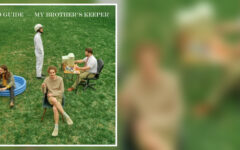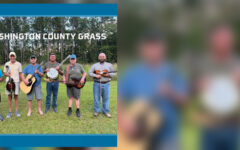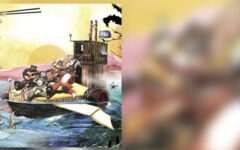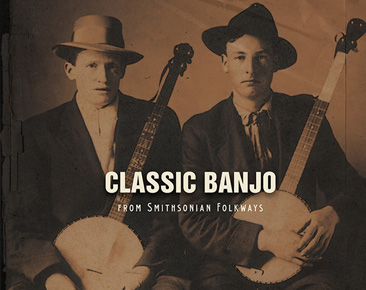
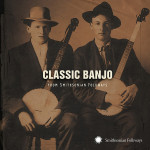 We’ve written a lot about the banjo lately at Bluegrass Today, and why not? It is one of the central pillars of the music that we love, even if the instrument and those who play it are the butt of a seemingly endless string of jokes.
We’ve written a lot about the banjo lately at Bluegrass Today, and why not? It is one of the central pillars of the music that we love, even if the instrument and those who play it are the butt of a seemingly endless string of jokes.
If, like me, you love how great banjo picking can elevate a song, or if you’re curious to learn more about banjo styles and banjo history, Classic Banjo from Smithsonian Folkways is a must-have CD.
In the grand style of just about everything having to do with the Smithsonian, Classic Banjo is more than entertainment. With 30 songs and a sweeping 44-page booklet, it’s a reference work that you can dip into repeatedly.
The songs are plucked from banjo recordings in the Ralph Rinzler Folklife Archives and Collections at the Smithsonian’s Center for Folklife and Cultural Heritage. Most are studio renditions but some of the songs are field recordings. (Not to get political here, but imagine what we might be missing if, during some budget debate decades ago, Ralph Rinzler had been deemed “non-essential.”)
All styles of banjo picking (including clawhammer, frailing and Scruggs style) are represented and a wide range of music is sampled (blues, jazz, Irish, folk and, of course, bluegrass.)
Also here: Many of the pickers who would constitute a Who’s Who of Banjo in America, if there were such an animal. Here are just a few: Snuffy Jenkins, Dock Boggs, Pete Seeger, Bill Keith, Roni Stoneman, Tony Trischka and Bill Evans. You’ll notice one glaring omission. Earl Scruggs is not represented as a player, though he is referenced several times in the booklet.
For instance, here’s what the liner notes say about Sally Ann, a recording by Snuffy Jenkins from the 1956 album American Banjo Tunes and Songs in Scruggs Style:
“Scruggs popularized the three-finger picking style that caught on with bluegrass fans and young folk song enthusiasts, and while many thought the style originated with him, it did not.” Jenkins, the booklet notes, was one of Earl’s influences.
I’d prefer that he be represented by more than words. It’s the equivalent of a survey of American cooking that leaves out a recipe from Julia Child but mentions her in passing in a footnote. But that’s perhaps the only flaw in this grand collection.
In addition to Sally Ann, standout tracks include Gut Bucket Blues, a Louis Armstrong composition with Don Vappie on a six-string banjo; Smokey Mokes, with Roger Sprung on banjo and Doc Watson on guitar; Rambling Hobo, with Doc on banjo; Foggy Mountain Top, with Ola Belle Reed on banjo and vocals; and Bluegrass Breakdown. That last one is a 1964 recording by Bill Monroe and the Blue Grass Boys, featuring Bill Keith on the five-string. There’s a bit of bluegrass lore on this one. Bill Monroe introduces his banjo man as “Brad” Keith because, of course, there could only be one Bill in Bill’s band!
In short, this fine collection is anything you want it to be. If you want a quick take on the banjo in American music, spend a pleasant hour or so listening through these 30 selections. It can be your Cliff’s Notes guide. On the other hand, if you want to fully immerse yourself in all things banjo, you can follow these songs back to the original recordings, read through the orginal sources that are cited here and make it, as Ralph Rinzler did, your life’s work.
Either way, this collection belongs in the collection of anyone interested in the banjo or in traditional American music.


